
In this section we will look at
1.)About Incubator
2.)Types of Chicken Incubator
3.)Key Factors Influencing Incubator Prices
4.)Leading Chicken Egg Incubator Brands in Kenya
5.)Local vs Imported Incubators
6.)Keyval Incubator Price List
8.) FAQ about incubators
9.)Incubator price in Kenya jumia
10.)List of Chicken Incubator on Jiji .

An egg incubator is a device that simulates the conditions necessary for hatching eggs. It controls temperature, humidity, and turning schedules to ensure successful hatching. In Kenya, farmers use incubators to improve productivity by reducing the reliance on hens for natural incubation, which can be inconsistent.

Image of chicks inside an incubator
Depending on the specific needs, incubators vary in size from small units suitable for hobbyists to large-scale commercial units capable of incubating thousands of eggs.
Types of Chicken Egg

Image of a 80 egg incubator
Manual incubators require the farmer to turn the eggs manually. These are typically smaller and more affordable, priced from Ksh 5,000 to Ksh 10,000 for capacities of 48–60 eggs.

They are ideal for beginners and small-scale farmers with fewer eggs to hatch. Some popular models for small-scale use include EcoChick with an egg capacity of 60 eggs priced around Ksh 6,500.
Image of a 9-35 Egg Incubator
Semi-Automatic Egg Incubators
These incubators are semi-automated, requiring less manual effort as they have some automated features, often including temperature control but requiring manual turning. They’re suitable for mid-sized farms and cost between Ksh 12,000 and Ksh 20,000 for capacities up to 100 eggs. Examples include Brinsea Eco (48-egg) - priced around Ksh 14,000 and Royal Bird (96-egg) - priced around Ksh 18,000.

Image of a 40 egg chicken incubator
Fully Automatic Egg Incubators
Image of a 64-Eggs Automatic Egg Incubator
Fully automatic incubators automate most processes, including egg turning, temperature, and humidity regulation. These are ideal for larger farms due to their high capacity and minimal labor requirements, available in capacities from 100 eggs up to 5,000 eggs. The pricing is tiered by capacity 100-200 eggs costing on average 30,000Ksh while 300-500 eggs coat on average 75,000 Ksh and 1,000+ eggs cost on average Ksh 100,000 and above.
Solar-Powered Egg Incubators

Image of a 192 eggs solar incubator by ecochicks
In areas with unreliable electricity, solar-powered incubators provide a solution. While slightly more expensive, the investment can be worth it for consistent hatching. Solar incubators are available in various capacities, with prices starting at Ksh 25,000 for smaller units and reaching up to Ksh 200,000 for large capacities of over 1,000 eggs.
Key Factors Influencing Incubator Prices

Capacity
The capacity of an incubator is the primary price determinant. Small-scale models (30–60 eggs) are the most affordable, while high-capacity incubators (500–5,000 eggs) are priced higher due to their size, build quality, and additional features.
Automation Level

Incubators with full automation, including automatic turning, humidity control, and digital temperature monitoring, are priced higher than manual or semi-automatic models. Fully automated systems minimize labor, making them ideal for large farms, thus justifying the higher price.
Power Source
Electric incubators are the standard in Kenya, but solar-powered models are available for areas with limited electricity. Solar units typically cost more due to the additional technology and materials involved.
Brand and Origin
Imported brands such as Rcom, Brinsea, and Hovabator often come with higher price tags due to quality, durability, and brand reputation. Locally manufactured options, like EcoChick, are more budget-friendly but may lack advanced features.
Temperature and Humidity Controls
Advanced incubators equipped with digital controls, humidity sensors, and alarms are more expensive than those with analog systems. For commercial farmers, these features ensure higher hatch rates and are considered a worthwhile investment.
Leading Chicken Egg Incubator Brands in Kenya
EcoChick Incubators
A popular local brand known for affordable, functional incubators suited for small to medium-scale farmers. Prices range from Ksh 5,000 for a 60-egg manual model to Ksh 35,000 for a 300-egg automatic model.
Brinsea Incubators
Imported from the UK, Brinsea models are well-regarded for quality and durability. They come with digital controls, ideal for mid-sized to large-scale farms. Prices vary from Ksh 20,000 for small, semi-automated models to Ksh 100,000+ for fully automated, high-capacity models.
Royal Bird Incubators
Known for mid-range pricing and available in capacities up to 500 eggs, Royal Bird incubators cater to medium to large-scale farmers with a blend of affordability and functionality. Prices range from Ksh 18,000 to Ksh 80,000, depending on capacity.
Rcom Incubators
Imported from South Korea, Rcom offers high-quality, fully automatic incubators with premium features. These models are among the most expensive, with prices ranging from Ksh 25,000 for small units to over Ksh 150,000 for large-capacity models.
HatchPro Incubators
Known for their larger capacities and durability, HatchPro models are ideal for large-scale operations. They often come in 1,000+ egg capacities, priced from Ksh 120,000 upward.
Local vs Imported Incubators

Image of an Automatic incubator with a capacity of 1056 eggs with 12trays and 12 crates.
The price variance between locally manufactured and imported incubators is significant. While imported models offer advanced technology and durability, they often come with higher import taxes and shipping costs, making them more expensive. Locally produced incubators are budget-friendly and accessible, though they may lack some of the more advanced features.
Locally Manufactured Incubators
These generally cost less due to reduced manufacturing and shipping costs. They are available for as low as Ksh 5,000 for small, manual units, with larger automatic units costing around Ksh 30,000.
Imported models are priced higher due to added costs. They range from Ksh 15,000 for basic models to upwards of Ksh 200,000 for high-capacity units. Farmers seeking high reliability and additional features often find imported models worth the investment.
Keyval 64 eggs | 13,500Ksh |
Keyval 128 eggs | 18,500Ksh |
Keyval 192 eggs | 23,500Ksh |
Keyval 256 eggs | 30,000Ksh |
Keyval 320 eggs | 35,000Ksh |
Keyval 528 eggs | 50,000Ksh |

Image of Incubator Spare Part Switch
Incubator Limit switch | 500Ksh |
200 watts incubator Air Heater | 1000Ksh |
200 watts incubator Water Heater | 1000Ksh |
Incubator Exhaust Fan | 1000Ksh |
300 Watts Incubator Air heater | 1200Ksh |
300 Watts Incubator Water heater | 1200Ksh |
500 Watts Incubator Water heater | 1700Ksh |
500 Watts Incubator Air heater | 1500Ksh |
AC/DC Incubator controller | 4500Ksh |
Incubator Fan | 4500Ksh |
Incubator Turning Motor | 2000Ksh |
Setter Trays for 88 Eggs | 800 Ksh |

XM-18 Automatic Egg Incubator Controller costing 18,000 Ksh
FAQ about Chicken incubators
Difference between a brooder, hatchery and Incubator
Incubator
The Purpose of an incubator is to artificially creates the ideal conditions for hatching eggs by controlling temperature, humidity, and ventilation. An incubator is used for the hatching phase only, incubators simulate the conditions a hen would provide to develop fertilized eggs until they hatch. In terms of how It Works ,eggs are placed in the incubator, where the environment is closely monitored, typically kept at a temperature of around 99.5°F (37.5°C) and a specific humidity level. The incubator may automatically turn the eggs to ensure even heat distribution. Eggs stay in the incubator for 21 days for chickens to hatch.
Hatchery
A hatchery is a facility or operation that manages the entire hatching process on a large scale, usually including both the incubator and hatching equipment. Hatcheries are where eggs are incubated, hatched, and sometimes vaccinated before chicks are sold or distributed. A hatchery works by containing several incubators, climate control systems, and sometimes specialized areas for sorting and caring for chicks post-hatch. Hatcheries may operate on a commercial scale, hatching hundreds or thousands of chicks. The Eggs are incubated and hatched, and the chicks are typically held for only a short period before being moved to a brooder or sold.
Brooder
A brooder is a controlled environment where newly hatched chicks are kept warm and protected until they grow feathers and can regulate their body temperature. Brooders are used for the rearing phase post-hatch, brooders provide heat, food, water, and protection for young chicks. They include a heat source (often a heat lamp), bedding, feeders, and water dispensers. The temperature is gradually lowered as the chicks grow.Chicks stay in the brooder for a few weeks, typically until they’re 4–6 weeks old, depending on the breed and growth rate.
How long do eggs take to hatch in an incubator?
The time it takes for eggs to hatch in an incubator depends on the type of bird, as different species have different incubation periods with majority requiring an Optimal Temperature of 99.5°F (37.5°C). Chickens require a duration of 21 days while Duck take a duration of 28 days (except for Muscovy ducks, which take 35 days) whereas for Quails the duration is 16-18 days and Turkeys take a duration of 28 days for Geese the time taken to hatch is 28-35 days (depending on the breed) while for Ostriches the duration is 42-46 days
How much is a 10,000 egg incubator in Kenya?
The cost of a 10,000-egg incubator in Kenya varies based on the manufacturer, features, and additional specifications such as whether it's electric or solar-powered. Large-scale industrial incubators that can accommodate thousands of eggs typically cost between Ksh 800,000 and Ksh 1,500,000 depending on the supplier and additional functionalities such as automated temperature and humidity controls
How much is a 2000 egg incubator in Kenya?
The cost of a 2000-egg incubator in Kenya varies depending on the features, brand, and supplier. On average, these larger-scale incubators are priced between Ksh 140,000 and Ksh 180,000. These models are often automatic and can include advanced features like dual power functionality (AC/DC), humidity control, and egg turning mechanisms, which justify their price for commercial poultry farmers
How old should eggs be for incubator
For successful incubation, eggs should ideally be no more than 7 days old. Fresh eggs yield the best hatch rates, and their viability begins to decline after a week .Avoid washing eggs, as this removes the protective bloom. Use only clean eggs for incubation. The reason why Age Matters is because the embryo inside an egg begins to develop naturally after it is fertilized but remains dormant under cool storage conditions. Over time, the embryo weakens, leading to lower hatchability.
List of Chicken Incubator on Jiji .
64eggs Automatic Incubator Ac/Dc | 0716955756 | 16,500Ksh |
352 Eggs Incubator | 0714757859 | 44,000Ksh |
528 Chicken Eggs Automatic Incubator | 0722362981 | 50,000Ksh |
300 Egg Incubator | 0721780466 | 46,000Ksh |
1056 Chicken Eggs Automatic Incubator - Locally Made | 0722362981 | 80,000Ksh |
4400 Chicken Industrial Eggs Incubator | 0722362981 | 180,000Ksh |
192 Automatic Egg Incubator | 0799543406 | 24,000Ksh |
104 Eggs Automatic AC DC Incubator | 0722362981 | 31,000Ksh |
Solar Powered 128 Eggs Incubator | 0714757859 | 18,000Ksh |
256 Egg Incubator | 0714757859 | 28,000Ksh |
320 Eggs Incubator | 0714757859 | 31,000Ksh |
Automatic 128 Egg Incubator | tel:0714757859 | 17,000Ksh |
Incubator price in Kenya jumia
64-Eggs Automatic Egg Incubator | 15,000Ksh |
10,000Ksh | |
104 Chicken Egg Automatic IncubatorAC /DC | 18,399 Ksh |
192 Auto Egg Poultry Incubator | 26,700Ksh |
128 Chicken Egg Automatic Incubator | 23,000 Ksh |
364 eggs Poultry Egg Incubators | 79,000 Ksh |
528 Poultry Egg Incubators | 109,000Ksh |


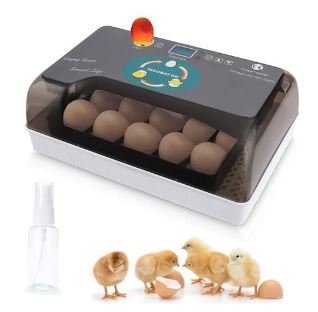

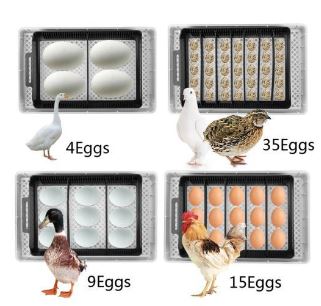

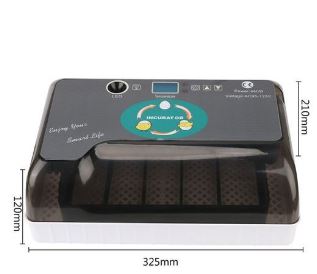
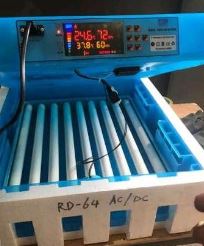



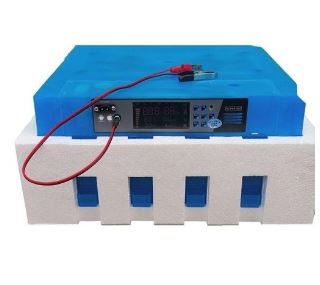
Comments